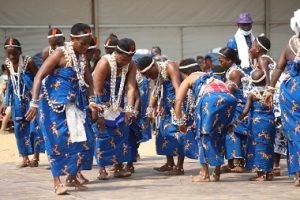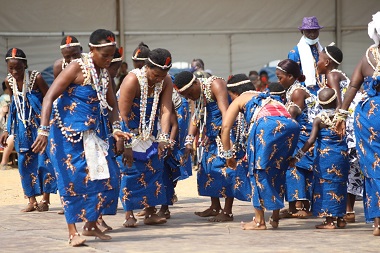Over the past few days, Gregorio Almeida, a filmmaker and educator from Brazil, has been exploring Benin. His journey has taken him from the Slave Museum in Ouidah to the Door of No Return, as he sought to better understand Vodun, a religion often associated with danger and superstition. In a country where Vodun has been misunderstood for centuries, Almeida is determined to form his own perspective on the faith.
“I came here to learn more about Vodun, because in Brazil, there’s always a misconception about what Vodou is,” says Almeida. “In Brazil, we don’t really know Vodun. Sure, we know we are Afro-descendants through religion, but we don’t know much more than that. That’s why I came to understand it better. I was in Abomey Calavi to ask a Vodun dignitary more about it. In Brazil, we see Vodun as fetishes, essentially witchcraft, but here I’m starting to understand the philosophy behind it.”

Almeida’s visit coincides with Benin’s Vodun Days, an annual celebration dedicated to the rich history of Vodun, a religion that has spread throughout the world, particularly to Latin America and the Caribbean during the transatlantic slave trade. For many in Benin, these days are not just about celebrating Vodun, but also about correcting historical injustices suffered by their African ancestors.
Vodun is not just a religion; it is deeply ingrained in the cultural fabric of Benin. It is passed down from generation to generation, with practices and teachings that have been maintained for centuries. This cultural transmission is evident in the life of Ornella Tchiaka, a Vodun practitioner born into a family rooted in the tradition.
“I was born in the convent of the deity, so these things come from my ancestors,” explains Tchiaka. “They practiced it, and I was born into it. I found it, and I continue it.”
The Beninese government has recognised the importance of showcasing Vodun to the world and has organized a three-day festival to celebrate the religion and its cultural significance. Through this celebration, the government aims to counter the negative stereotypes surrounding Vodun and highlight its spiritual importance to both local and international audiences.
Bakary Olushegun, the Beninese Minister of Foreign Affairs, stresses that Vodun is not the dangerous, malevolent force it has often been portrayed as. “Vodou is not something evil, as it has been presented to us,” he says. “Here in Benin, we have chosen, along with the entire Black community worldwide, to reveal Vodun, to show that Vodun is not negative — it is our culture. It is the essence of who we are.”
These Vodun Days also serve as a platform to attract global attention, especially from potential investors. Through these festivities, Benin hopes to challenge misconceptions and present Vodun as an integral part of the nation’s identity. The government envisions Vodun as a means of both cultural preservation and economic development.
“Benin is committed to its image and wants to attract investors,” says Assogba. “Through these Vodun Days, which will now be held annually, the government can demonstrate that Vodun is not just a religion but a state of mind, a philosophy of life.”
By celebrating Vodun in such an open and inclusive way, Benin is redefining its cultural heritage for the 21st century, providing a space for both locals and tourists to reconnect with their roots and learn about a religion that has had a profound influence on the African diaspora




